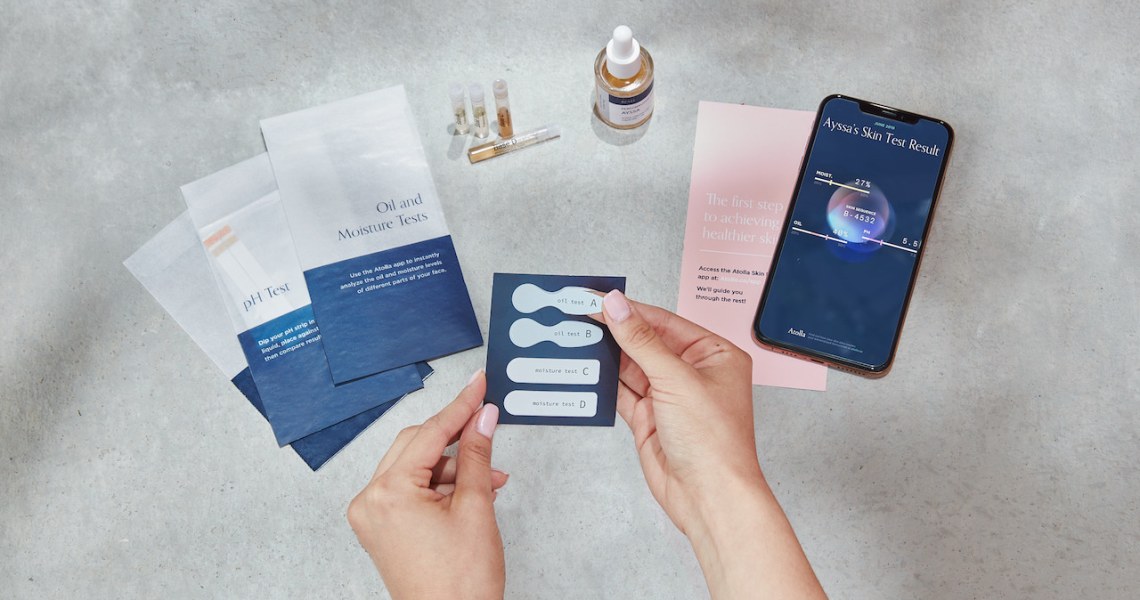At-home testing kits are making personalized beauty much more personal.
In September, customized serum brand Atolla launched with an offer to simultaneously measure epigenetic conditions such as skin moisture and firmness, and create customized serums for $45. Atolla’s debut built on what has been happening in the larger skin-care landscape: In February, personalized product recommendation brand Skintelli came to market in beta; its proposition allows clients to apply an adhesive to their skin to collect a genetic sample and send it back for analysis. DNA-testing company Advanced Genomic Solutions’s SkinHealth Genetic Test, which debuted in November 2018, offers something similar.
Though the DNA testing company does not sell skin-care products, customers can send in a cheek-swab to analyze their genetic predisposition to acne, elasticity and firmness. Upon receiving these test results, clients can then opt to take their results to their aesthetician or dermatologist for product advice.
“What’s happened is that with the direct-to-consumer approach of Ancestry.com kits and 23andMe, there has been an incredible demand for DNA testing. But Ancestry.com doesn’t make you healthier, it’s just fun to know, ” said Kevin MacDonald, Advanced Genomic Solutions founder and managing director.
Advanced Genomic Solutions sells its DNA testing kits to corporations as a white-label offering or as a benefit perk to corporations, as well as to the end customer through its DTC site. Typically, DTC purchases of its standard health kit are made by women 45 years old, said MacDonald. The AGS team assumed it would be the same for when it launched its SkinHealth kit. However, DTC purchases, which account for approximately 20% of SkinHealth sales, are made by women ages 35 and younger. MacDonald said this is because its customers are looking to reduce the guesswork of finding the right skin-care products. AGS has sold nearly 10,000 kits via DTC and wholesale, but has not engaged in any DTC marketing; however, it does plan on promoting its kit to skin-care professionals in its network during the holiday season, for $140, so that they can market and sell it to patients for $199.
Atolla, for its part, has found that 20% of its customers are men and that a “surprising” portion of customers are also buying more than one kit at a time to share with someone else, said Dr. Ranella Hirsch, Atolla co-founder. Atolla hosted a pop-up in 2018 in New York City and has invested in Facebook and Instagram ads for marketing.
“Men are not as interested in the discovery component of beauty, so we are giving them this data to see some results about what they need to change,” she said.
Ad position: web_incontent_pos1
Outside of its niche use by indie brands and corporate clients, AGS said there is an appetite for its product within the traditional beauty sphere. Currently, the company is in discussion with two skin-care companies in France and in the U.S., said MacDonald. The primary motivation is because these companies are trying to figure out how to get people to buy and continue to use their non-customized products.
“They want stickiness,” he said. “They know DNA testing isn’t going away and want to embrace it.”
Estée Lauder Companies’ Clinique and L’Oreal’s La Roche-Posay have tried to offer some level of personalization to customers in the past, but these brands are inherently held back because they can only recommend their own existing products versus creating a new formula from scratch. MacDonald said its potential strategic partners are considering white-labeling SkinHealth to sell to customers and then charging an additional fee for recommending products from their whole portfolio of brands. This would ostensibly offer a level of neutrality.
But any at-home test for either genetic skin factors like moisture levels or even DNA is not a panacea for all skin issues. There are too many variables such as stress, hormone cycles and diet that can contribute to certain conditions like acne, said Genevieve Vielbig, a nurse at med spa Just Ageless in New York City. While the most defining factor for something like acne is having a genetic predisposition, there is no “magical cure,” she said.
Atolla requires a person to re-test their skin before any subscription renewal so that its algorithms become more attune to the changes in an individual’s skin, said Hirsch. Meanwhile, AGS can currently test for 26 genes, but MacDonald said, by 2020, it should be able to test 60.




